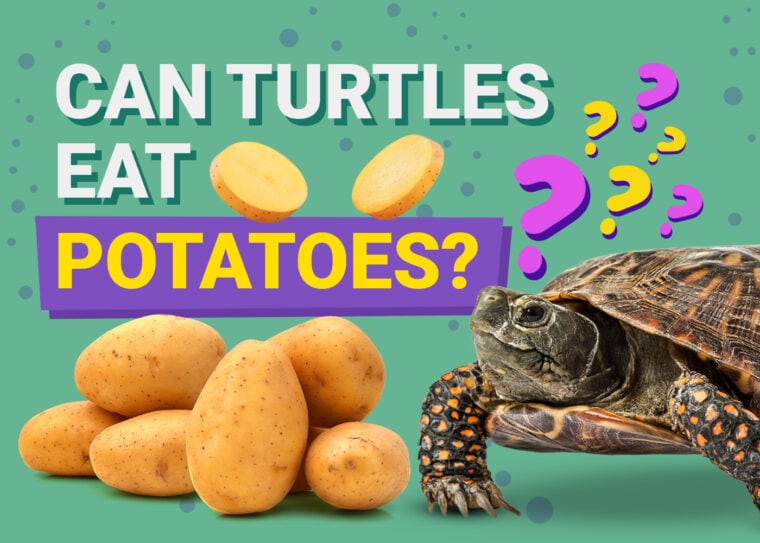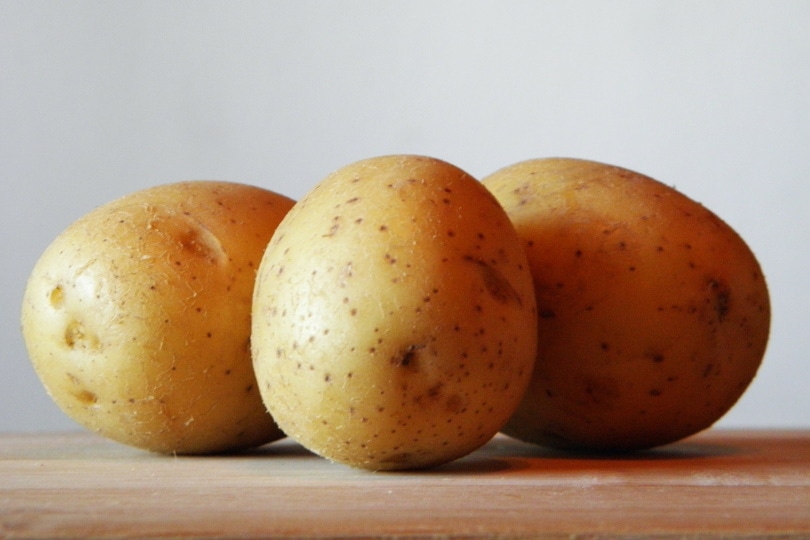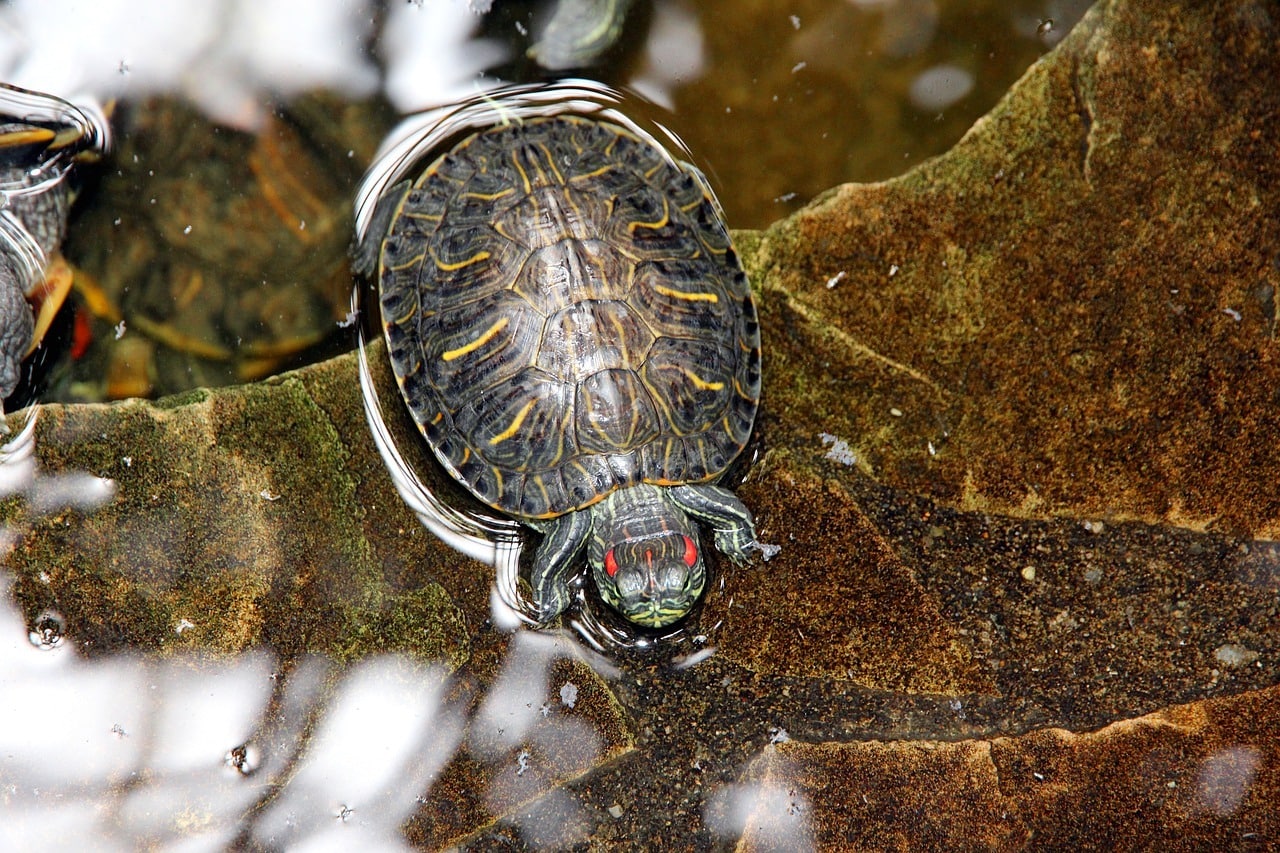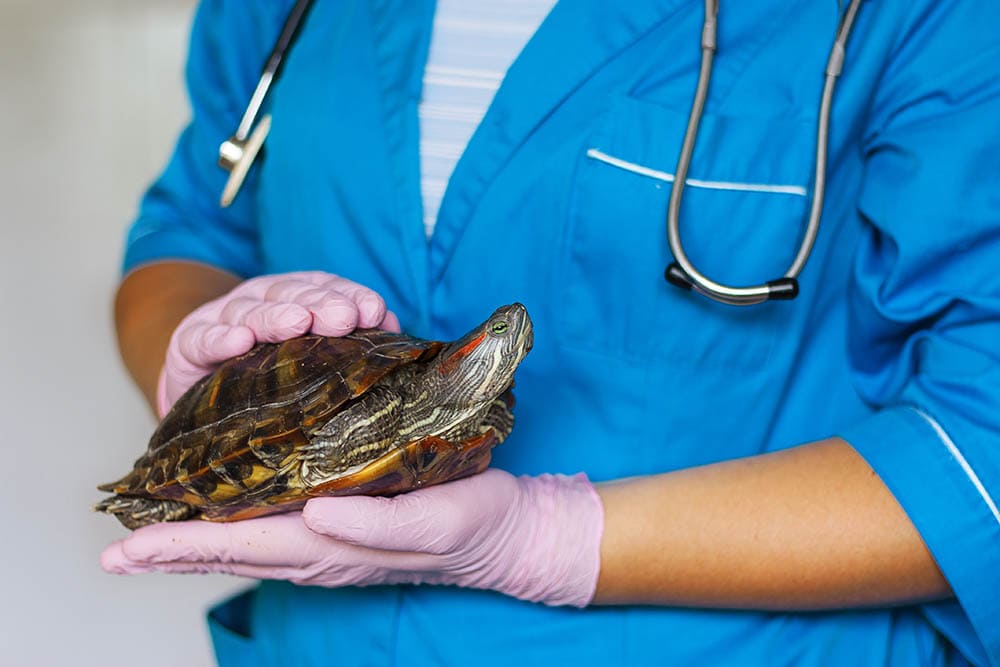
Do you often cook potatoes and want to give a few pieces to your turtle? The good news is that cooked, peeled potatoes won’t hurt a healthy adult omnivorous turtle. However, they aren’t the most nutritious options for them either .
While potatoes are technically veggies, they aren’t as nutrient-rich as spinach and kale. Plain, boiled white potatoes can be a source of certain vitamins and minerals. However, there are better sources of these nutrients that aren’t so starchy and full of carbs. Raw potatoes are considered unsafe for turtles and shouldn’t be offered to them. Likewise, unripe potatoes are also considered unsafe for pet turtles and shouldn’t be a part of your pet’s diet.
In this article, we explore the ins and outs of potatoes and their role in a pet turtle’s diet. Since there are many turtle species that are kept as pets, we’ll be focusing on two popular species: the red-eared slider turtle (Trachemys scripta elegans) and the Eastern box turtle (Terrapene carolina carolina).
 What Do Turtles Eat?
What Do Turtles Eat?
Before you can determine where potatoes fit into your turtle’s diet, it is vital to understand their diet as a whole. Red-eared sliders and Eastern box turtles are omnivores. They eat a mixture of plant and animal materials. As adults, red-eared sliders tend to lean closer to the vegetarian side. Conversely, adult box turtles tend to do best on a diet that’s split evenly between animal-based foods and plant-based foods. As juveniles, though, both species are primarily carnivorous. It is thought that this is likely due to their increased protein requirements for growth and development.
When turtles are kept as pets, the carnivorous part of their diet primarily consists of various prey. The most popular choices are insects, as they are easy to gut-load with calcium prior to being offered to your pet. They are also relatively inexpensive and easy to propagate yourself as a consistent food supply for your pet.
Turtles may also eat feeder fish purchased from a pet store. In many cases, these also provide a source of exercise and mental stimulation. After all, your turtle has to catch the fish, and that can be a lot of work! However, live fish can easily carry parasites and bacteria, so they aren’t the safest options, though your turtle can have a lot of fun eating them. To minimize this risk, many people opt for thawed frozen feeder fish for their turtles. Many species of fish (such as goldfish) are also high in fat and thiaminase, which is something to factor in.

What About Plants?
As your turtle gets older, you’ll need to start offering them more vegetables. Large turtles are often housed in ponds, and pond plants offer great foraging opportunities for pet turtles. Nonetheless, their diet can be supplemented with other vegetables.
Here is a list of vegetables that we recommend as part of your turtle’s regular diet:
As you can see, potatoes are not on this list!
Reasons to Avoid Feeding White Potatoes to Your Turtle
We don’t recommend feeding white potatoes to turtles regularly for a few reasons. First, they are a member of the Solanum genus. Glycoalkaloids solanine and chaconine are both found in light amounts. The exact mechanism of the toxicity of these compounds is unknown, but certain foods in the Solanum family (such as nightshade, Solanum nigrum) are considered toxic for pet turtles. It is thought that the toxicity can range from mild irritation to severe organ damage, depending on the plant itself 1.
Second, white potatoes aren’t nearly as nutrient-dense as some other veggies out there. When you have foods like dandelion greens available, there are few reasons to feed your turtle potatoes. You’re much better off choosing something else instead!
Finally, potatoes are not considered healthy for pet turtles because they contain a high number of oxalates. These compounds (also known as oxalic acid) can interfere with calcium metabolism and lead to health issues in pet turtles (such as bladder stones).
- See Also: How Long Can Turtles Go Without Eating?

Can Turtles Eat Raw Potatoes?
Turtles should not be offered raw potatoes. Potatoes are commonly infected with a mold found in soils all over the world, Fusarium solani. This fungus is known to cause health issues in pet turtles. Therefore, raw potatoes shouldn’t be offered to them 2. Be mindful that it is not possible to assess whether a potato is mold free by just looking at it.
Can Turtles Eat Potato Leaves?
Potato leaves are potentially toxic to turtles. They contain high amounts of both solanine and glycoalkaloid. The plant essentially uses these chemicals to protect itself from certain pests. However, these chemicals are considered toxic. They can harm people and animals alike 3. The dose required for toxicity in turtles is not known, but the risk is enough to caution against offering potato leaves to your pet when safer alternatives exist.
The stems, sprouts, and leaves all contain high levels of these chemicals. Therefore, you should avoid feeding them to your turtle. Keep them put up and away—do not feed them to your turtle or put them in your turtle’s vicinity.
Can Turtles Eat Unpeeled Potatoes?
The peel of the potato may contain Fusarium solani and shouldn’t be offered to pet turtles.
In addition, the peel can contain trace levels of pesticides and fertilizers, neither of which are safe for our tiny turtles. Theoretically, you can wash the potato very well and remove much of this residue. But you’ll never know if you’ve successfully removed all those chemicals or not. Therefore, you shouldn’t offer potato peels to your pet turtle.

Can Turtles Eat Mashed Potatoes?
There is no reason you can’t mash the cooked potato before you feed it to your turtle. It may make eating it a bit easier—though it will mean that the potato won’t float on water! Some turtles won’t recognize mashed potatoes as food. It mostly depends on your turtle.
However, you should ensure that you don’t add any of the usual additives to mashed potatoes, like salt, herbs, butter, and other seasonings. Many of these things are not healthy for turtles. Too much salt can cause electrolyte imbalances, and butter can add unnecessary amounts of fat to their diet.
Can Turtles Eat Sweet Potatoes?
Raw sweet potatoes possess the risk of Fusarium solani, so they aren’t considered safe until they’re cooked. However, they also contain high amounts of oxalic acid, which can hinder calcium absorption in turtles. Without enough calcium, turtles can run into all sorts of problems. Therefore, like with white potatoes, we recommend serving sweet potatoes in relatively small amounts. They can be offered a few times a month at most. You shouldn’t feed them to your turtle regularly, since it may lead to calcium deficiencies in the long run.

Final Thoughts
Cooked, unseasoned white potatoes aren’t blatantly toxic to healthy adult omnivorous pet turtles. However, we don’t recommend adding them to your turtle’s usual diet. They contain oxalates that can interfere with calcium absorption. If potatoes are fed in high amounts, this can cause calcium deficiency.
It’s quite easy for a turtle to consume too many potatoes, and it can lead to nutritional deficiencies if your turtle cuts other foods out of their diet, or it can lead to obesity if they increase their overall caloric intake. Either way, overconsumption won’t end well for your turtle!
Related Topics:

 What Do Turtles Eat?
What Do Turtles Eat?





